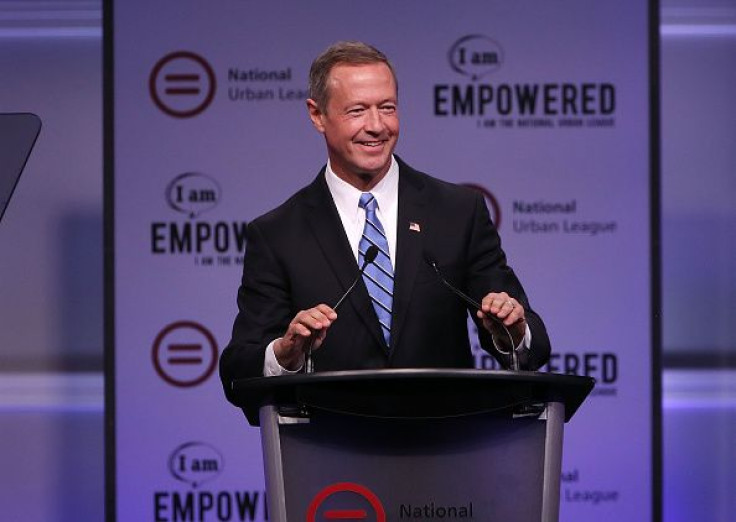Can Hillary Clinton, Martin O'Malley Mend Fences With Black Lives Matter Movement?

A handful of presidential candidates arrived at the National Urban League conference in South Florida on Friday with hopes of leaving with the weight of the black community behind them. But for some, past blunders would be an unavoidable handicap in making headway.
Black voters came out in record numbers in the last two presidential elections, with 95 percent voting for Barack Obama in 2008 and 93 percent supporting the president's re-election bid in 2012. Now, the 2016 Democratic candidates are looking to draw those same voters to the polls next year.
Former Secretary of State Hillary Clinton and Maryland Gov. Martin O'Malley were both up against past missteps -- each used the phrase "all lives matter" early in their campaigns, to the affront of those they were trying to court. But while O’Malley struggled to win over the crowd at the National Urban League conference, Clinton left the stage to a standing ovation.
Clinton acknowledged her failures with the black constituency in recent years -- and in doing so, she seemed to win over the audience Friday morning at the Broward County Convention Center in Fort Lauderdale, Florida. She called on Americans to do some "soul searching" about race relations and urged those who have not experienced systemic racism in their own lives to practice "humility" with those who have.
“Yes, what people say matters, but what they do matters more,” Clinton said.
Strong cheers for Hillary Clinton in the convention hall at the National Urban League conference. pic.twitter.com/xXyw0MFa9z
— Joy Reid (@JoyAnnReid) July 31, 2015There were significant fences to mend: Some have criticized Clinton's recent response to police brutality, saying she approached the subject with empty rhetoric. In addition, Clinton did not attend the 50th anniversary of the Bloody Sunday march in Selma, Alabama, choosing instead to attend a Clinton Foundation event. And she waited 19 days to respond publicly to last year's death of Michael Brown, who was killed in a confrontation with a Ferguson, Missouri, police officer.
When she approached the podium in Fort Lauderdale, she had yet to address the fatal shooting this month of Samuel DuBose by a white police officer in Cincinnati, and so the audience waited to see if they would hear her say his name. She did.
“Together, we’ve mourned Tamir Rice and Eric Garner, Walter Scott and Freddie Gray, and most recently, Sam DuBose. These names are emblazoned on our hearts,” Clinton said. “We’ve seen their faces, we’ve heard their grieving families. We’ve seen a massacre in Charleston, and black churches set on fire -- today, in 2015.”
I'm not a @HillaryClinton fan, but she's delivering a great speech, speaking to this audience at @NatUrbanLeague conf #SaveOurCities #RoN
— Nicole Sandler (@nicolesandler) July 31, 2015National Urban League member Dara Kalima, 36, came to the conference hesitant to embrace Clinton, but found herself moved by the Democratic candidate's proclamations of responsibility to the Black Lives Matter movement. She felt that Clinton was ready to join the movement in a meaningful way, and perhaps was past the mistakes that had made Kalima hesitant to support the former secretary of state, U.S. senator and first lady. Kalima said the mistakes included Clinton's disappointing remarks on racial relations and her campaign video filmed in Brooklyn, New York, which many criticized for not featuring any of the borough's African-American residents.
"The willingness to be held accountable was what really struck me," Kalima said. "That was the first time she addressed the community in a productive way."
Listening to Hillary Clinton at #SaveOurCities National Urban League Convention #yaac pic.twitter.com/KmChTI86Av
— Michael E. Parker (@meparker7) July 31, 2015O’Malley followed Clinton at the convention with a speech that mostly addressed his criminal justice reform experience in Baltimore. He spoke of residents who had bravely advocated for change in the criminal justice system and announced his plan for rebuilding trust between black communities and law enforcement.
“How many individuals, like Sandra Bland, have been subject to abusive arrest when the cameras were not on?" he asked. “How many Walter Scotts have been savagely shot down? ... How many names do we not know?”
Bland, 28, was found dead in her Texas jail cell July 13 days after being arrested following a traffic stop. Scott was a 50-year-old man shot multiple times and killed by a white police officer in North Charleston, South Carolina, in April.
While Kalima praised both Clinton and O'Malley, she said that only the former secretary of state was able to meet the expectations of the Black Lives Matter movement, which works to improve racial tensions in the criminal justice system.
"Hillary understands the message and evoked the level of passion and commitment to the topic at hand," Kalima said, "and O'Malley definitely spoke to his record and what he was able to do in Baltimore, but there was nothing really engaging."
Polite but mild applause for Martin O'Malley as he is introduced by his fellow ex mayor Marc Morial. pic.twitter.com/flvD9KNqxo
— Joy Reid (@JoyAnnReid) July 31, 2015Panel moderator Michael E. Parker said that O'Malley's speech "really resonated because it was a touching story of people who lost their lives to do the right thing."
O' Malley said to the crowd, "Every story reminds us that Americans of color endure a constant state of vulnerability, even when they're driving to work."
However, it was Clinton who left the crowd energized, Parker said.
"The phrases and words that she used seemed to be in sync with the real problems of the community," said Parker, CEO and founder of the self-improvement online community You Are A CEO. "I thought she was one of the few candidates who had a pretty broad discussion of all the major issues."
© Copyright IBTimes 2024. All rights reserved.












